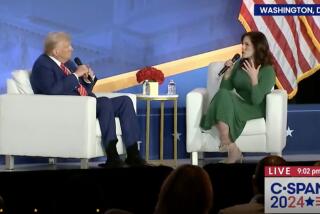Trump wants the contract to develop a new Air Force One canceled, calling the program ‘ridiculous’

The aircraft used by President Obama, built by Chicago-based Boeing Co., have been in service since the Reagan administration and are due to reach the end of a 30-year design life in 2017.
Reporting from Washington — President-elect Donald Trump took aim at Air Force One on Tuesday, criticizing the cost of the iconic 747 jumbo jet that has served as the president’s flying White House and projected America’s might wherever it lands.
The aircraft used by President Obama, built by Chicago-based Boeing Co., have been in service since the Reagan administration and are due to reach the end of a 30-year design life in 2017.
Boeing, which has built presidential jets since the early 1960s, has been doing early development work on the replacement likely to be outfitted with the latest in gadgetry, including top-secret communications equipment, countermeasures to spoil missile attacks, and aerial refueling capability so it can fly for days without landing.
Trump would not get a chance to fly in a new Air Force One unless he is reelected; the replacement isn’t slated to begin flying until 2024 at the earliest. So far, Boeing has been given three contracts amounting to $170 million to develop the aircraft, which is based on the new and larger version of the 747 dubbed the 747-8 Intercontinental.
“Boeing is building a brand new 747 Air Force One for future presidents, but costs are out of control, more than $4 billion. Cancel order!” Trump tweeted.
Trump told reporters in the lobby of Trump Tower in New York on Tuesday that he thought the Air Force One program was “ridiculous.”
“Boeing is doing a little bit of a number,” he said. “We want Boeing to make a lot of money — but not that much money.”
As president-elect, Trump has no power to cancel procurements, but the Air Force has yet to issue a contract for the next-generation Air Force One, which will include at least two planes.
Federal budget documents published in February estimated research, test and development costs on the program to be around $2.87 billion through fiscal year 2021. The figure doesn’t include the costs of new planes, however. When that is factored in, the price tag may be around $4 billion, U.S. officials said.
“We are currently under contract for $170 million to help determine the capabilities of this complex military aircraft that serves the unique requirements of the president of the United States,” Boeing said Tuesday in a statement. “We look forward to working with the U.S. Air Force on subsequent phases of the program allowing us to deliver the best plane for the president at the best value for the American taxpayer.”
It is rare for a president-elect to publicly call out a company by name because of the chilling effect it might have, and it wasn’t clear what prompted Trump’s complaint. Boeing’s shares were down $2 in early trading after Trump’s tweet, but recovered throughout the day, closing up 8 cents, or .05%, to $152.24.
The latest episode raised questions about Trump’s potential conflicts in light of his undisclosed financial holdings, and whether he held Boeing stock at the time of the tweet. Trump sold all his Boeing stock in June, transition spokesman Jason Miller insisted, though no documentation was made public.
“This really speaks to president-elect’s focus on keeping spending down across the board,” Miller told reporters. “We are going to look for areas where we can keep costs down and look for areas where we are going to try to save money.”
White House spokesman Josh Earnest told reporters traveling on Air Force One that the plane was “nearing the end of its projected life” and the Obama administration wanted to ensure that future presidents would have a “modern presidential aircraft.”
“The American people would expect that future U.S. presidents would benefit from unique and upgraded capabilities while they are traveling and representing the interests of the United States around the world,” he said, adding that the Pentagon and Boeing were acting on recommendations from national security and technical experts.
With worldwide demand steadily shrinking, Boeing has repeatedly slowed the 747 production rate to one per month. The company said this year that if new orders didn’t roll in, it was “reasonably possible that we could decide to end production of the 747.”
In its heyday, Boeing was producing 60 jumbo jets a year, with many of the components coming from Southern California.
Boeing has several hundred suppliers in the U.S. supporting the 747 program. One of the largest is Triumph Aerostructures, which assembles the 747’s center fuselage panels in Hawthorne.
Triumph ships fuselage panels and sends them in three custom railroad cars to Boeing’s assembly plant in Everett, Wash.
Rep. Rick Larsen and Sens. Patty Murray and Maria Cantwell, all Democrats from Washington state, defended Boeing, the largest exporter in the U.S. with customers in 150 countries.
“Replacing the 26-year-old Air Force One aircraft will support good-paying jobs throughout northwest Washington and is important to ensuring the safety and security of future presidents,” they said in a statement. “The president-elect’s tweet does nothing to change those basic facts.”
The only other large commercial aircraft manufacturer is Airbus Group SE, which is based in Leiden, Netherlands.
Twitter: @wjhenn
ALSO:
Climate change is real: Just ask the Pentagon
Overweight, tattooed, stoned? The Pentagon may still want you
UPDATES:
2:35 p.m.: This story was updated with Boeing’s closing stock price.
12:45 p.m.: This story was updated with comment from the White House and from Trump.
This story was originally published at 9:50 a.m.
More to Read
Get the L.A. Times Politics newsletter
Deeply reported insights into legislation, politics and policy from Sacramento, Washington and beyond. In your inbox three times per week.
You may occasionally receive promotional content from the Los Angeles Times.











